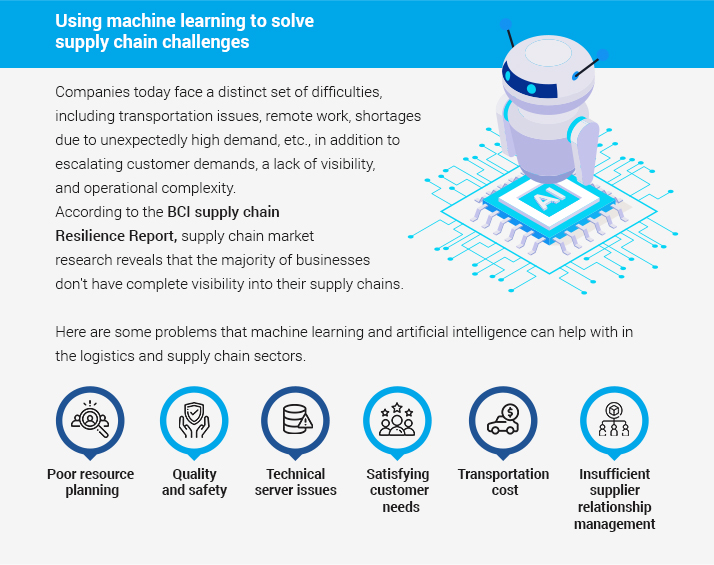Machine Learning in Supply Chain Management
By Sanjay Puri, CEO, C1 Global


Machine learning will be used for the supply chain management for procurement solutions to manage the entire business to ensure to supply of a product with success mode to single & multiple suppliers. there will be an option for many of the users like (Supplier/Distributors/ Retailers and Manufacturers)
Use Cases of machine learning: Machine learning can be tracked in every part of the supply chain, including procurement, manufacturing, inventory management, warehousing, logistics, and customer service. Let's take a closer look at the benefits of machine learning in supply chain management. To begin with let's start with understanding supplier management.
key challenges in the supply chain
Machine learning can help businesses manage their supply chains better and become more robust to disturbances. Currently, there is a lack of transparency, instability, and uncertainty in the global supply chain industry.


There are five dimensions of supply chain vulnerability.


Companies are currently reviewing their global supply chain strategy in light of the new reality, and COVID-19 has only accelerated this process. Traditional, linear supply chains can be changed into linked, intelligent, scalable, and configurable digital supply networks with the use of technologies like IoT, AI, and machine learning.
Advantages of machine learning in the supply chain
Using machine learning in the supply chain helps retailers, suppliers, and distributors drive the transformational changes that are so necessary in these times. By reducing operational overhead and mitigating risks, to improving supply chain forecasting, speeding up deliveries, and improving customer service, machine learning offers unprecedented value to supply chain operations.
The value of machine learning in supply chain management
- Cost-effectiveness: Machine learning's cost-effectiveness, which systematically promotes waste reduction and quality enhancement
- Streamlined inventory management: Streamlining product movement in the supply chain without requiring the supply chain companies to keep a large amount of inventory
- Seamless Supplier relationship management: Due to easier, quicker, and more efficient administrative procedures, there is seamless supplier relationship management.
- Intelligent decision-making: Making use of actionable insights from machine learning enables speedy problem-solving and continuous improvement.
In conclusion
Using machine learning in the supply chain helps retailers, suppliers, and distributors drive the trans-Supply chain efficiency plays a crucial role in any enterprise. Businesses operating within tight profit margins can benefit greatly from any process improvements.
Machine learning makes it easier to forecast demand accurately in global supply chains and deal with volatility challenges. According to Gartner, at least 50% of global companies in supply chain operations will be using AI and ML related transformational technologies by 2023. As a result, machine learning is becoming increasingly popular in the supply chain industry.
However, businesses need to plan for the future and start investing in machine learning and related technologies today in order to reap the full benefits of machine learning in the supply chain sector.
